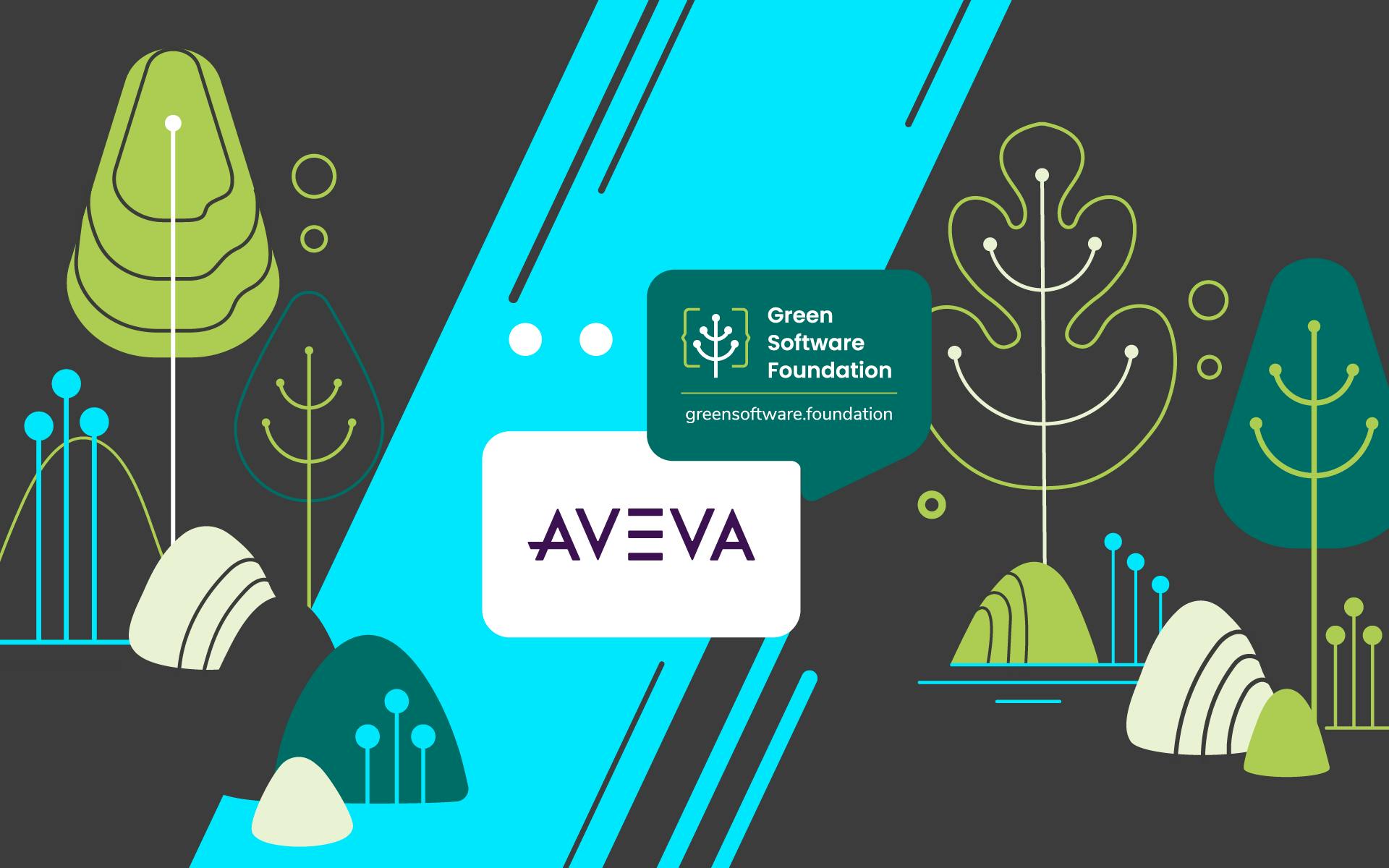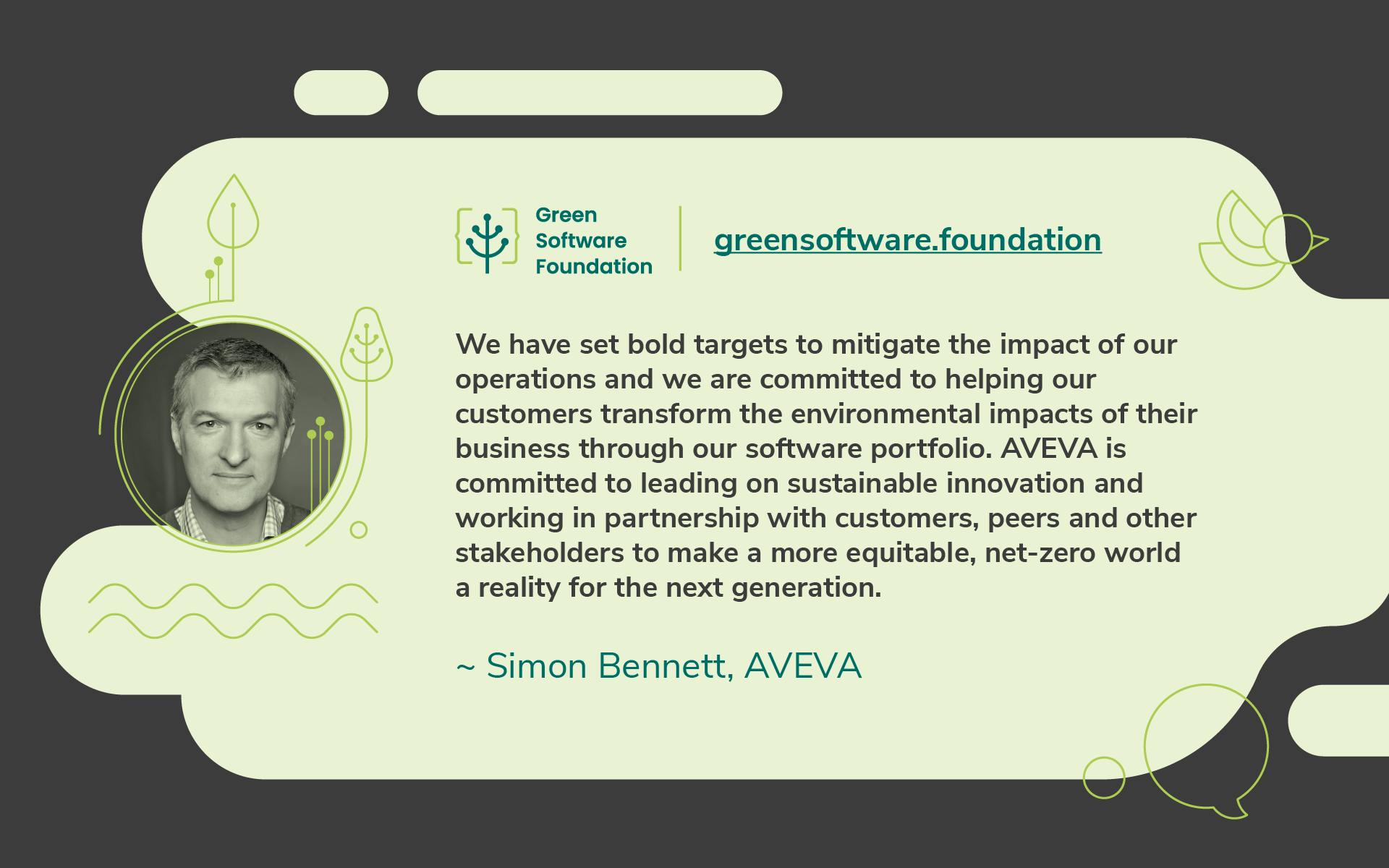Meet Simon Bennett, Global Head of Research at AVEVA
“We have set bold targets to mitigate the impact of our operations and we are committed to helping our customers transform the environmental impacts of their business through our software portfolio. AVEVA is committed to leading on sustainable innovation and working in partnership with customers, peers and other stakeholders to make a more equitable, net-zero world a reality for the next generation,” said Simon Bennett, Global Head of Research at AVEVA. He reveals what that means with regard to green software in the interview with GSF.
Tell us about your interest in green software and your journey to GSF.
AVEVA is a global industrial software leader focused on sparking innovation to drive responsible use of the world’s resources. More than 20,000 enterprises across 12 diverse industrial sectors in over 100 countries rely on AVEVA’s platform-agnostic solutions to help them deliver life’s essentials: safe and reliable energy, food, medicines, infrastructure and more.
AVEVA’s secure industrial cloud platform and applications enable businesses to harness the power of their information and improve collaboration with customers, suppliers and partners. By connecting people with trusted information and AI-enriched insights, AVEVA enables efficient engineering and optimized operations, driving growth and accelerating organizations’ sustainability ambitions.
We manage sustainability through the lens of our operational footprint, our technology handprint, and our inclusive culture. The first plank of our sustainability approach focuses on reducing our carbon footprint across our global operations by 2030, putting us on course to achieve net-zero value chain emissions by 2050. Here, we have set bold targets to mitigate the impact of our operations. In parallel, we are committed to helping our customers transform the environmental impacts of their business through our software portfolio. We refer to this as our technology handprint and believe this is where we have the biggest opportunity to make a positive impact. The third plank is our inclusive culture, which sets out how we strive to enable an environment of inclusion, wellbeing and opportunity for all our people and communities.
AVEVA is committed to leading on sustainable innovation and working in partnership with customers, peers and other stakeholders to make a more equitable, net-zero world a reality for the next generation. In July 2021 AVEVA made its first public pledge to join the United Nations’ Race to Zero. The FTSE100 initiative is committed to using science-based targets to minimize emissions and is aligned with the highest level of ambition under the Paris Agreement. In signing the UN Global Compact’s Business Ambition for 1.5°C pledge, we joined the many customers and partners who share AVEVA’s sense of urgency around the climate crisis and are committed to action. We are also members of the Business Council on Climate Change, as well as the World Economic Forum 2030 Vision initiative, focused on supporting the adoption of advanced technologies in support of the UN’s Sustainable Development Goals.
More recently, we partnered with leaders from 50 of the world’s most progressive companies as part of the First Movers’ Coalition, a commitment to purchase a proportion of industrial materials and long-distance transportation from suppliers using near-zero or carbon-zero solutions. In addition to our 2030 ambitions, within our latest 2022 Sustainability Report, we affirm our new interim 2025 targets that guide our continued transformation towards net zero and a more just, inclusive and sustainable future.
What do you expect to achieve by working with the GSF and in green software in general?
At AVEVA, sustainability has never been higher on our agenda. We are acting to prioritize and embed sustainability into our operations, culture and business strategy. We want to further drive responsible use of the world’s scarce resources, and lower emissions through energy management solutions, while simultaneously optimizing circularity and energy efficiency.
At the same time, we realize that achieving the goals of the Paris Agreement will require collective action, and that it is only by collaborating with others on the same trajectory that the industrial ecosystem can tackle the complex challenges ahead of us – whether this is through data-led relationships such as the alliances mentioned above, or through systemic platforms such as the Connected Industrial Economy.
We are inspired by the growing focus of our customers and partners in addressing climate change. As part of growing our technology handprint to support customers in mitigating the environmental impact of their business, we are increasing investments in our software’s capabilities to accelerate decarbonization and sustainability. We are accelerating our efforts to establish a baseline in our customers’ saved and avoided emissions, to help inform our future focuses and targets. We are also focused on developing and deploying green product design principles in our software and leveraging our learnings and best practices with our broader ecosystem.
Now, in joining the First Movers’ Coalition, we are working to strengthen and promote the use of green software. In Davos, we announced the establishment of a center of excellence for sustainability software that aims to drive new frontiers of sustainability innovation for our customers worldwide and support our commitment to ensuring responsible use of the world’s resources.
How can companies encourage more young software engineers to participate in the green software movement?
At AVEVA, we are committed to capturing and nurturing next-generation talent and ideas to help build on our team’s expertise and collective passion for sustainability. We host regular inhouse sustainability-focused hackathons that are open to our graduate engineers and broader research and development team. We also run dedicated Student Academic Competitions each year, focused on our process simulation and digital twin technologies, with an internship and cash prizes for winning students. Last year’s competition saw more than 90 engineering students from North America and Europe enter a variety of submissions in sustainable simulation and optimization.
As part of our commitment to fostering the innovators of the future, we are also proud of our ongoing partnership with Schneider Electric on their global Go Green student sustainability competition. The competition calls for bold ideas to help reimagine the future of energy in our homes, industries and communities. In addition to the major cash prize, finalists receive professional mentorship from experts at Schneider Electric and AVEVA, as well as interviews with our human resources teams and the opportunity to be considered for early career opportunities.
Lastly, through our academic collaborations, we also provide complimentary software to schools across the world through our partnerships with more than 400 academic institutions. This helps us train more than 20,000 engineering students as part of our commitment to equip the next generation of experts with the technology skills they need to advance sustainable industries, while acting as collaborative innovation incubators for a number of our university partners.
Any other matters you would like to share with us on green software and sustainability?
AVEVA’s software is increasingly leveraged by industries to advance the low-carbon energy transition, enhance circularity, and enable greater resilience.
With digitalization being one of the most crucial drivers of industrial decarbonization, innovation and growth, we see the adoption of green software initiatives as vital to both our own ambitions and our customers’ broader net zero goals. As members of the Green Software Foundation, we look forward to collaborating with like-minded innovators to develop standards and best practices that will help accelerate our efforts to further embed sustainability principles both in our software portfolio and across our ecosystem. We also hope to help raise awareness and inspire others to take action on helping progress our net zero future.

This article is licenced under Creative Commons (CC BY 4.0)
